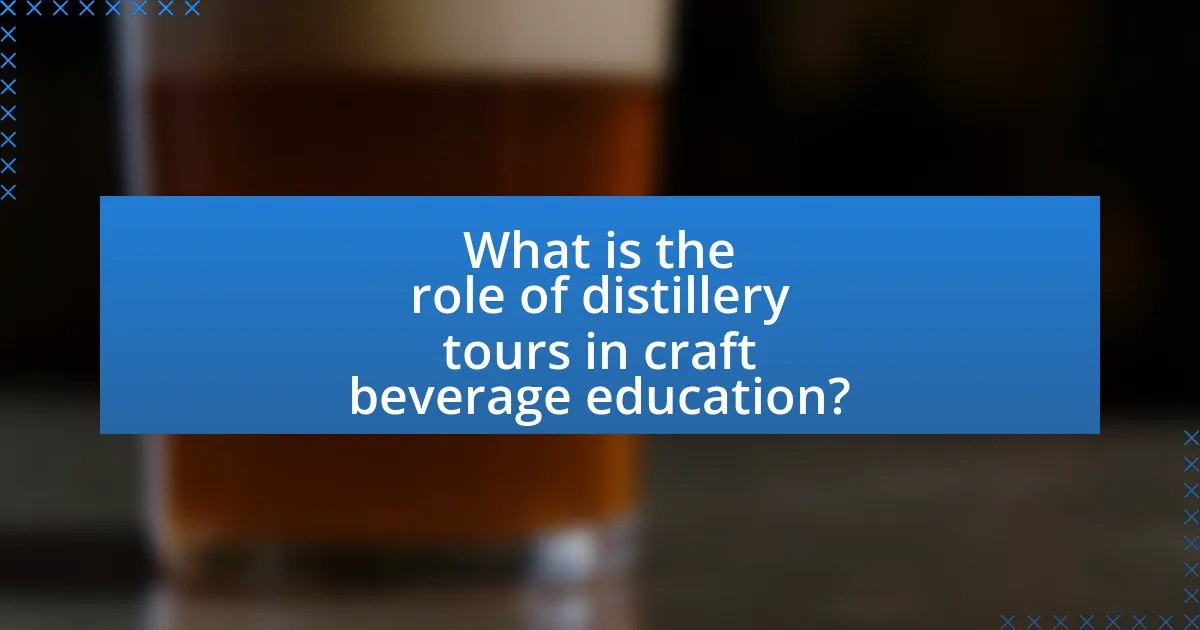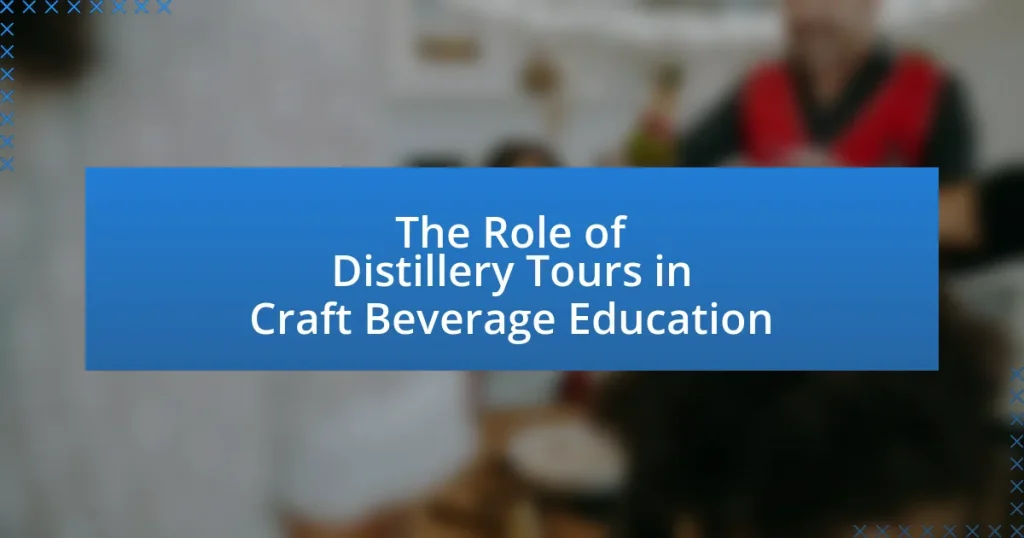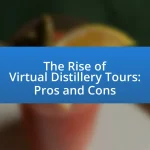Distillery tours are essential for craft beverage education, offering hands-on experiences that enhance understanding of production processes such as fermentation, distillation, and aging. These tours provide visitors with direct insights into the craftsmanship behind beverages, fostering appreciation and knowledge retention. Key elements covered during tours include equipment, ingredients, and tasting sessions, which engage multiple senses and deepen consumer connections to the products. Additionally, distillery tours promote local distilleries, boost consumer engagement, and can be improved through innovative practices and technology integration, ultimately benefiting both the industry and the community.

What is the role of distillery tours in craft beverage education?
Distillery tours play a crucial role in craft beverage education by providing hands-on experiences that enhance understanding of the production process. These tours allow visitors to observe the intricate steps involved in crafting beverages, such as fermentation, distillation, and aging, which fosters a deeper appreciation for the craftsmanship behind each product. According to a study published in the Journal of Food Science Education, experiential learning, such as that gained through distillery tours, significantly improves knowledge retention and consumer engagement in the beverage industry. This direct interaction with the production environment and the opportunity to ask questions from knowledgeable staff further enriches the educational experience, making distillery tours an essential component of craft beverage education.
How do distillery tours enhance the understanding of craft beverages?
Distillery tours enhance the understanding of craft beverages by providing firsthand insights into the production processes, ingredients, and techniques used in crafting these beverages. During these tours, visitors observe the equipment, learn about fermentation and distillation, and often engage with knowledgeable staff who explain the nuances of flavor profiles and regional variations. This experiential learning fosters a deeper appreciation for the craftsmanship involved, as evidenced by studies showing that consumers who participate in such tours report a greater understanding of and connection to the products they consume.
What key elements are typically covered during a distillery tour?
A distillery tour typically covers the production process, equipment used, ingredients, and tasting sessions. During the tour, visitors learn about the fermentation, distillation, and aging processes that contribute to the final product. The equipment, such as stills and fermentation tanks, is often showcased to illustrate how spirits are made. Additionally, the tour highlights the specific ingredients, like grains or botanicals, that define the distillery’s unique offerings. Tasting sessions allow participants to sample the spirits, enhancing their understanding of flavor profiles and production techniques.
How do sensory experiences during tours contribute to education?
Sensory experiences during tours significantly enhance education by engaging multiple senses, which facilitates deeper learning and retention of information. When participants taste, smell, and see the craft beverages being produced, they create strong associations with the educational content presented, such as the ingredients, processes, and cultural significance of the beverages. Research indicates that experiential learning, which includes sensory engagement, leads to improved memory retention; for instance, a study published in the Journal of Educational Psychology found that students who engaged in hands-on learning retained 75% of the information compared to only 10% retention from traditional lectures. This evidence supports the notion that sensory experiences during distillery tours not only make the learning process more enjoyable but also more effective.
Why are distillery tours important for consumers?
Distillery tours are important for consumers because they provide firsthand knowledge about the production process, enhancing appreciation for the craft. By observing the methods used in distillation, consumers gain insights into the ingredients, techniques, and time involved in creating spirits, which fosters a deeper understanding of quality and flavor profiles. Research indicates that experiential learning, such as that gained through tours, significantly increases consumer engagement and loyalty to brands, as evidenced by a study published in the Journal of Consumer Research, which highlights that consumers who participate in product experiences are more likely to develop a preference for those products.
What knowledge do consumers gain about the production process?
Consumers gain knowledge about the production process by understanding the steps involved in creating craft beverages, including sourcing ingredients, fermentation, distillation, and aging. Distillery tours provide firsthand insights into these processes, allowing consumers to see equipment, learn about techniques, and appreciate the craftsmanship behind each product. For example, during a tour, visitors may observe the fermentation tanks and learn how yeast converts sugars into alcohol, which enhances their appreciation for the complexity of flavors in the final beverage. This experiential learning fosters a deeper connection to the product and informs consumers’ purchasing decisions.
How do tours influence consumer preferences and choices?
Tours significantly influence consumer preferences and choices by providing immersive experiences that enhance product knowledge and emotional connections. When consumers participate in distillery tours, they gain firsthand insights into the production process, which fosters appreciation for the craftsmanship involved. Research indicates that 70% of consumers are more likely to purchase a product after experiencing a tour, as they feel a stronger connection to the brand and its story. This experiential learning not only informs their choices but also shapes their perceptions of quality and authenticity, leading to increased brand loyalty.
What impact do distillery tours have on the craft beverage industry?
Distillery tours significantly enhance the craft beverage industry by fostering consumer engagement and education. These tours provide visitors with firsthand experiences of the production process, which deepens their appreciation for the craftsmanship involved in creating beverages. According to a study by the American Craft Spirits Association, 70% of distillery visitors reported increased interest in purchasing craft spirits after participating in a tour. This direct interaction not only boosts sales but also cultivates brand loyalty, as consumers develop a personal connection to the distillery and its products. Additionally, distillery tours often serve as platforms for storytelling, allowing producers to share their unique histories and philosophies, which further enriches the consumer’s understanding and enjoyment of craft beverages.
How do tours promote local distilleries and their products?
Tours promote local distilleries and their products by providing immersive experiences that educate visitors about the distillation process and the unique qualities of local spirits. These tours often include tastings, which directly engage consumers with the products, fostering a personal connection and encouraging purchases. According to a study by the American Distilling Institute, 70% of visitors to distilleries reported increased interest in purchasing products after participating in a tour. This direct interaction not only enhances brand loyalty but also boosts local economies by attracting tourism and supporting local businesses.
What role do tours play in fostering community engagement?
Tours play a significant role in fostering community engagement by creating opportunities for interaction and connection among participants. Through distillery tours, individuals gain insights into local craft beverage production, which enhances their appreciation for the community’s cultural and economic contributions. For instance, a study by the American Distilling Institute found that distillery tours can increase local tourism and support small businesses, thereby strengthening community ties. Additionally, these tours often encourage discussions about local history and traditions, further deepening the sense of belonging and community identity among participants.
How can distillery tours be improved for educational purposes?
Distillery tours can be improved for educational purposes by incorporating interactive elements such as guided tastings, hands-on workshops, and detailed explanations of the distillation process. These enhancements allow visitors to engage more deeply with the material, fostering a better understanding of the craft. For instance, research indicates that experiential learning significantly increases retention rates; a study by Kolb (1984) highlights that active participation leads to a more profound grasp of complex subjects. Additionally, providing educational materials, such as pamphlets or digital resources, can reinforce the information presented during the tour, ensuring that visitors leave with a comprehensive understanding of the distillation process and the history of the distillery.
What innovative practices can enhance the learning experience?
Innovative practices that can enhance the learning experience include interactive distillery tours that incorporate hands-on activities, such as tasting sessions and ingredient exploration. These practices engage participants actively, fostering a deeper understanding of the craft beverage process. Research indicates that experiential learning, where individuals participate in real-world activities, significantly improves retention and comprehension. For instance, a study published in the Journal of Educational Psychology found that students who engaged in hands-on learning scored 20% higher on assessments compared to those who learned through traditional lectures. This evidence supports the effectiveness of innovative practices like interactive tours in enhancing educational outcomes in craft beverage education.
How can technology be integrated into distillery tours?
Technology can be integrated into distillery tours through the use of augmented reality (AR) applications, interactive kiosks, and virtual reality (VR) experiences. AR applications can enhance visitor engagement by overlaying digital information about the distillation process and ingredients onto physical equipment, allowing guests to visualize complex concepts. Interactive kiosks can provide detailed information and multimedia presentations about the distillery’s history and production methods, enabling self-paced learning. VR experiences can transport visitors to different stages of the distillation process or historical contexts, offering immersive educational opportunities. These technological integrations not only enhance the visitor experience but also improve knowledge retention and engagement, as evidenced by studies showing that interactive learning methods significantly increase information retention rates.
What are the best practices for conducting effective distillery tours?
The best practices for conducting effective distillery tours include engaging storytelling, interactive experiences, and thorough knowledge of the distillation process. Engaging storytelling captivates visitors, making the history and significance of the distillery memorable. Interactive experiences, such as tastings or hands-on demonstrations, enhance visitor involvement and understanding. Thorough knowledge of the distillation process allows guides to answer questions accurately and provide insights into the craft, fostering a deeper appreciation for the beverage. These practices are supported by industry standards that emphasize visitor engagement and education as key components of successful tours.
How should tour guides prepare for an educational experience?
Tour guides should prepare for an educational experience by thoroughly researching the craft beverages they will be presenting, including their history, production methods, and unique characteristics. This preparation ensures that guides can provide accurate and engaging information to participants, enhancing their understanding and appreciation of the beverages. For instance, knowledge of the fermentation process and the ingredients used in distillation can help guides explain the nuances of flavor profiles, which is crucial for an informative tour. Additionally, guides should familiarize themselves with the distillery’s specific practices and any relevant local regulations, as this contextual knowledge enriches the educational experience for visitors.
What feedback mechanisms can be implemented to improve tours?
Surveys and post-tour interviews are effective feedback mechanisms that can be implemented to improve tours. These methods allow participants to share their experiences and suggestions directly after the tour, providing immediate insights into what aspects were enjoyable and what could be enhanced. Research indicates that 70% of customers are willing to provide feedback when prompted, which can lead to actionable improvements in tour content and delivery. Additionally, online review platforms can be monitored to gather broader feedback trends, helping distilleries identify common themes in visitor experiences.

![Top Distillery Tours in [Your Region]: A Local’s Guide](https://jd7.co.za/wp-content/uploads/Featured-image-Top-Distillery-Tours-in-Your-Region-A-Locals-Guide-150x150.webp)
